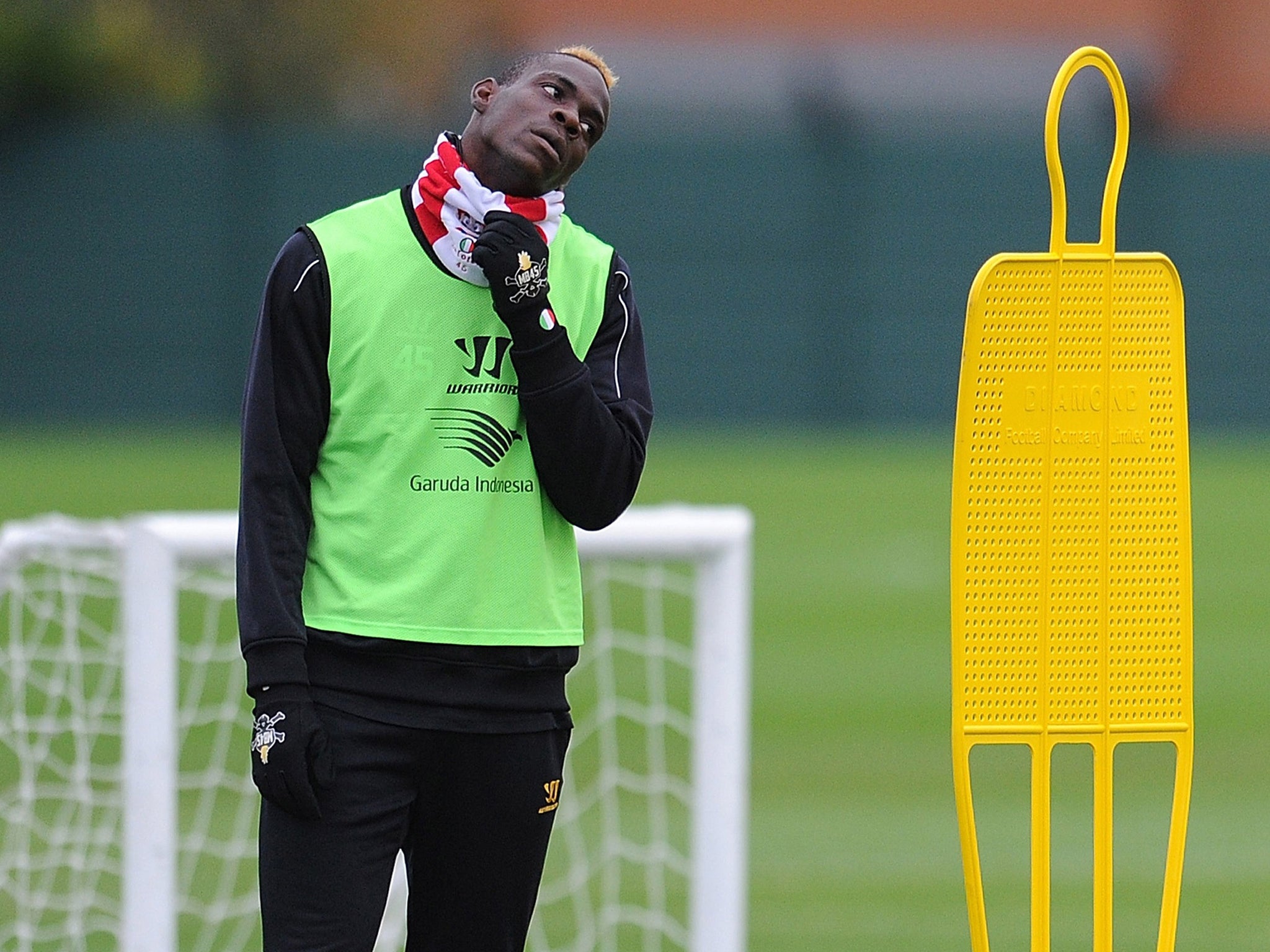Mario Balotelli comment: Time running out for 'lost boy' to shine at Liverpool, or anywhere
Maverick talent seems destined to drift down Euro leagues

Soon after the final whistle on Wednesday night, Mario Balotelli emerged from the tunnel at Anfield and walked slowly along the touchline, a hat pulled low over his eyes and what looked like Pepe’s shirt from the infamous exchange stuffed in a plastic bag. He did not seem to be in a hurry to go anywhere and was eventually led out of the stadium by an official, on his own without the friends and family who accompany many players on big match nights.
Not for the first time that night he looked a little lost, even a bit vulnerable. As ever, you wondered how much he knew about the storm that has blown up over his shirt exchange – initiated, it looked, by Pepe – or, more pertinently, whether he understood just what a big chance had just slipped through his fingers.
For a mad few months from the autumn of 2011 through to the summer of 2012, Balotelli occupied a unique position in English football, the boy-man who went out for an ironing board and came back with a trampoline. His personality and attributes felt like they belonged to a character in a children’s book – part-Baloo, part-Obelix, part-Gruffalo. But he was good fun, with two fingers to the disapproving world. At Euro 2012, his goals helped take Italy to the final and you wondered if Manchester City manager Roberto Mancini was right when he said that this boy could one day be the best in the world.
On Wednesday night, Balotelli got a glimpse of what the best in the world looks like but his current form does not justify him swapping shirts with Cristiano Ronaldo, let alone contemplating assuming his mantle one day.
Liverpool’s attitude to Balotelli is clear: many more games like the listless performance against Madrid and he will be out in January. At £16m it was a risk worth taking and one that can be written off. Allowing Balotelli to leave in January would not solve Liverpool’s goalscoring problem, but it would solve their Balotelli problem. He is on his final warning. But where would his future lead from here?
Even his agent, Mino Raiola, said in August, when the player joined Liverpool, that “another failure is inadvisable”. Ordinarily, no football agent says that about his client, but maybe even Raiola is tiring of talking up the biggest unfulfilled talent in the game. At just 24, Balotelli is approaching the danger zone in terms of the elite-level career. At this rate, there will not be many more nights facing the European champions in front of sell-out crowds.
Football is a more forgiving place these days, and there is a greater willingness to understand the different psychological needs of players rather than try to hammer square pegs into round holes. Indeed, at Liverpool the celebrated psychiatrist Dr Steve Peters writes profiles of the players, and his analysis of Balotelli must be one of the most fascinating documents in sport.
But Liverpool’s function in this is not a lifetime spent unpacking the layers of Balotelli’s personality. They need goals now. They need goals on Saturday against Hull City, and at the moment they have a centre-forward who is performing with the kind of absent-mindedness and indifference that, quite frankly, gets managers the sack.
Patrick Vieira, who tried to take Balotelli under his wing at City, tweeted that, quite rightly, the player should be judged on what he does on the pitch, not for swapping shirts at half-time. “Discuss his form, don’t just use him as an easy target,” Vieira wrote. But everyone knows that the problem is not the shirt swapping. It is the form.
There is a well-trodden path for the players who cannot establish themselves in the European elite and it is a soulless, if well-remunerated journey out to Russia’s Premier League, the Gulf states or perhaps now the Indian Super League. With the best will in the world, there are not many boys outside of the Volga who dream of growing up to play for Rubin Kazan.
In the end, footballers like Balotelli run out of managers with the energy or the self-belief to try to unlock the great talent that lurks within and they end with a choice of those who regard them as the least-worst option.
There is always the other side to Balotelli’s life, his complex and difficult childhood which led to his adoption by a white Italian family, the illness he suffered as a child and the vulnerability which he has always carried with him. In many respects, professional football has offered him an escape from all that, but at the moment he looks unwilling to give professional football anything in return.
There was one moment in the first half on Wednesday when Balotelli moved up through the gears and eased past Marcelo. One of the finest full-backs in the world looked like a little boy chasing his older brother. That is what Balotelli can do at his best, but now he seems to want to do very little at all – and if it carries on, he will be doing very little in front of smaller crowds, for less famous clubs.
Subscribe to Independent Premium to bookmark this article
Want to bookmark your favourite articles and stories to read or reference later? Start your Independent Premium subscription today.

Join our commenting forum
Join thought-provoking conversations, follow other Independent readers and see their replies